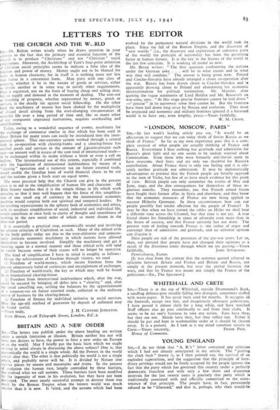LETTERS TO THE EDITOR
TFIE CHURCH AND THE WRLD Sus,_Dr. Re1ton writes wisely when he draws attention in your columns to the fact that the primary and essential function of the church is to produce " Christians " and not " Christian " social programmes. Moreover, the Archbishop of York's four-point definition of Christian social principles seems to indicate a false idea of the function and power of money. Money ought not to be blamed for faults in human character, for in itself it is nothing more nor less than barter in a convenient form. Man parts with one class of property, whether it be in the nature of goods or services, either w obtain another or in some way to satisfy other requirements. Price is regulated, not on the basis of buying cheap and selling dear, but on supply and demand at the moment of dealing. The non-use or hoarding of property, whether represented by money, goods or services, is the deadly sin against social fellowship. On the other hand the machinery of money has been choked by the multiplicity of absurd detail arising from the ever-changing circumstances of everyday life over a long period of time and, like so many other of our overgrown unpnmed institutions, requires overhauling and simplification.
Today, owing to a wonderful sequence of events, machinery for the exchange of commerce similar to that which has been used in Great Britain for many years can easily be introduced into the inter- national sphere. This one-currency system worked through a central bank in co-operation with clearing-banks and a clearing-house has enabled goods and services to the amount of L40,000,000,000 each year—an amount well in excess of the sum total of international trade— to be exchanged within its realm without a hitch or even a call on I bullion. The international use of this system, especially if combined with the liquidation of international indebtedness by means of a ;" clearing" operation and a turnover tax on future external trade, would enable the Gordian knot of world financial chaos to be cut and the nations given a fresh start on equal terms.
The most practical help that the Church can give in the present crisis is to aid in the simplification of human life and character. All Bible history teaches that it is the simple things in life which work miracles, so that it may well happen that the force of this simplifica- tion of one small cog of currency in the international economic machine would surprise both our spiritual and temporal leaders. Its far-reaching repercussions in the spheres both of economics and ethics, with its resultant simplification of social, industrial and individual life, would contribute at once both to clarity of thought and smoothness of working in the new social order of which so many dream in the after-war period.
It is essentially a practical step, economically sound and involving no adverse criticism of Capitalism as such. Many of the ethical evils in the body politic today are due to the over-elaborate and unneces- sarily intricate economic machinery in which nations have allowed themselves to become involved. Simplify the machinery and get it working again in a normal manner and these ethical evils will tend to vanish because some of their causes will no longer be operative.
The kind of simplification I have in mind is roughly as follows:
Given the achievement of freedom through victory, we need
(1) Freedom of world-money, which means freedom from the present unnecessary babel of currencies and entanglement of exchanges.
(2) Freedom of world-trade, the key to which may well be found in an international clearing-house.
(3) Freedom from international indebtedness which, after the war, could be secured by bringing all debts into a " clearing " and, after the usual cancelling out, settling the balances by the apportionment of a turnover-tax on future external trade, collected in the ordinary course of business by the clearing-house. (4) Freedom of finance for individual initiative in social services. 'Here the age-old method of guarantee by deposit of collateral may be found useful.


























 Previous page
Previous page